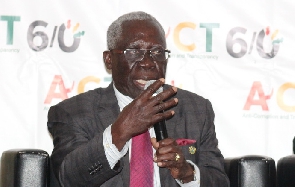 Ursula Owusu-Ekuful, Communications Minister
Ursula Owusu-Ekuful, Communications Minister
2017 Global Information Security Workforce Study-Benchmarking Workforce Capacity and Response to Cyber Risk conducted by Frost & Sullivan early this year has revealed that 66 per cent of organisations lack the skills in addressing cyber threats across the globe.
The study further projected cyber security workforce shortage to hit 1.8 million by the year 2022.
This revelation came to light at the official open of a maiden Certificate Course in Cyber Security, jointly organised by the Kofi Annan International Peacekeeping Training Centre (KAIPTC), and the e-Crime Bureau in Accra.
Addressing the participants, the Minister of Communications, Mrs. Ursula Owusu-Ekuful, indicated that the unavailability of the critical competencies to deal with cyber security issues was a primary cause of increased global challenges in the fight against cyber threat.
She further noted that despite the strides being made in Information Communication Technology (ICT) development in the country, the growing menace of cybercrime and other information security-related challenges was gradually eroding the significant gains made by the communication ministry.
According to her, the short supply of cyber security skills in Ghana was noticeable in the current curriculum of tertiary institutions.
“Few higher learning institutions run dedicated cyber security and forensics programmes, and we need to reverse this trend by encouraging educational institutions to offer practical cyber security courses to support government’s drive to step up Ghana’s cyber security readiness,” Mrs. Owusu-Ekuful reiterated.
She commended KAIPTC and e-Crime Bureau for the initiative, as it marked the fruition of a Memorandum of Understanding (MoU) signed between the two institutions in 2016 to jointly deepen knowledge and develop capacity in the area of cyber security, intelligence and forensics.
About 65 participants are currently, undergoing a week-long training course, which will focus on thematic areas such as cybercrimes and transnational crimes, cyber security governance and cyber defence and national security, as well as hands-on sessions to be conducted at the e-Crime Academy Cyber Lab.












